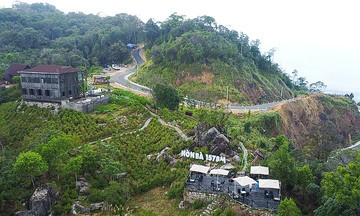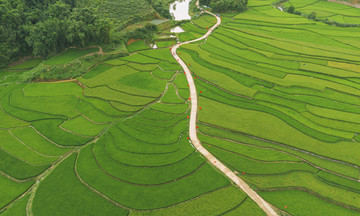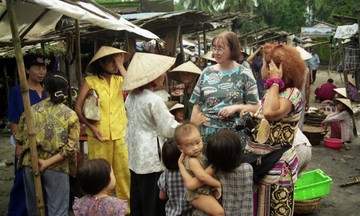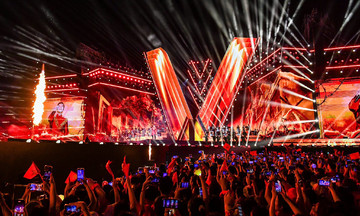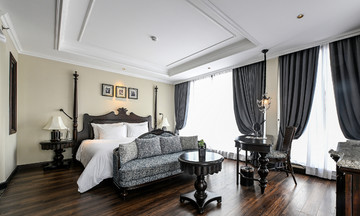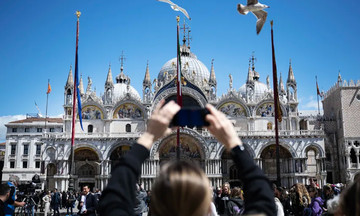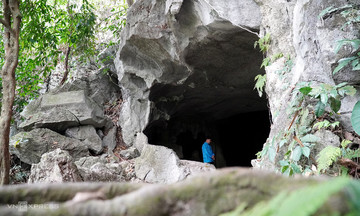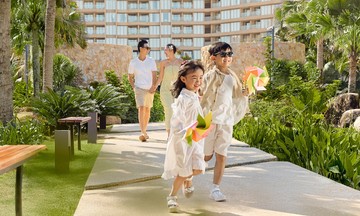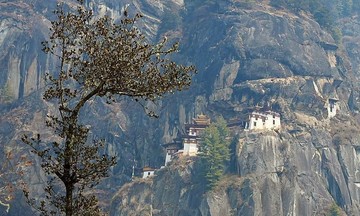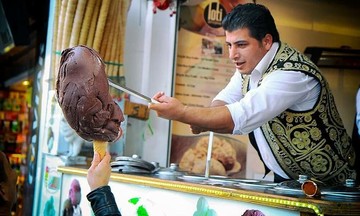An incident involving intoxicated South Korean tourists assaulting a Vietnamese individual taking photos at a photo booth in Hanoi on 11/7 garnered significant attention in both countries, as South Korea represents Vietnam's second-largest inbound tourism market. Many South Koreans expressed embarrassment over their compatriots' behavior. The company where one of the two South Koreans involved worked stated they had dismissed the employee and apologized to the Vietnamese people and those affected by the incident.
Addressing the incident, Viet Tourism Deputy General Director Pham Anh Vu stated that this was an isolated case and not representative of South Korean tourists in general. "Most of them are friendly and abide by Vietnamese law," Vu said, referring to the group that makes up 15% of the company's total international visitors.
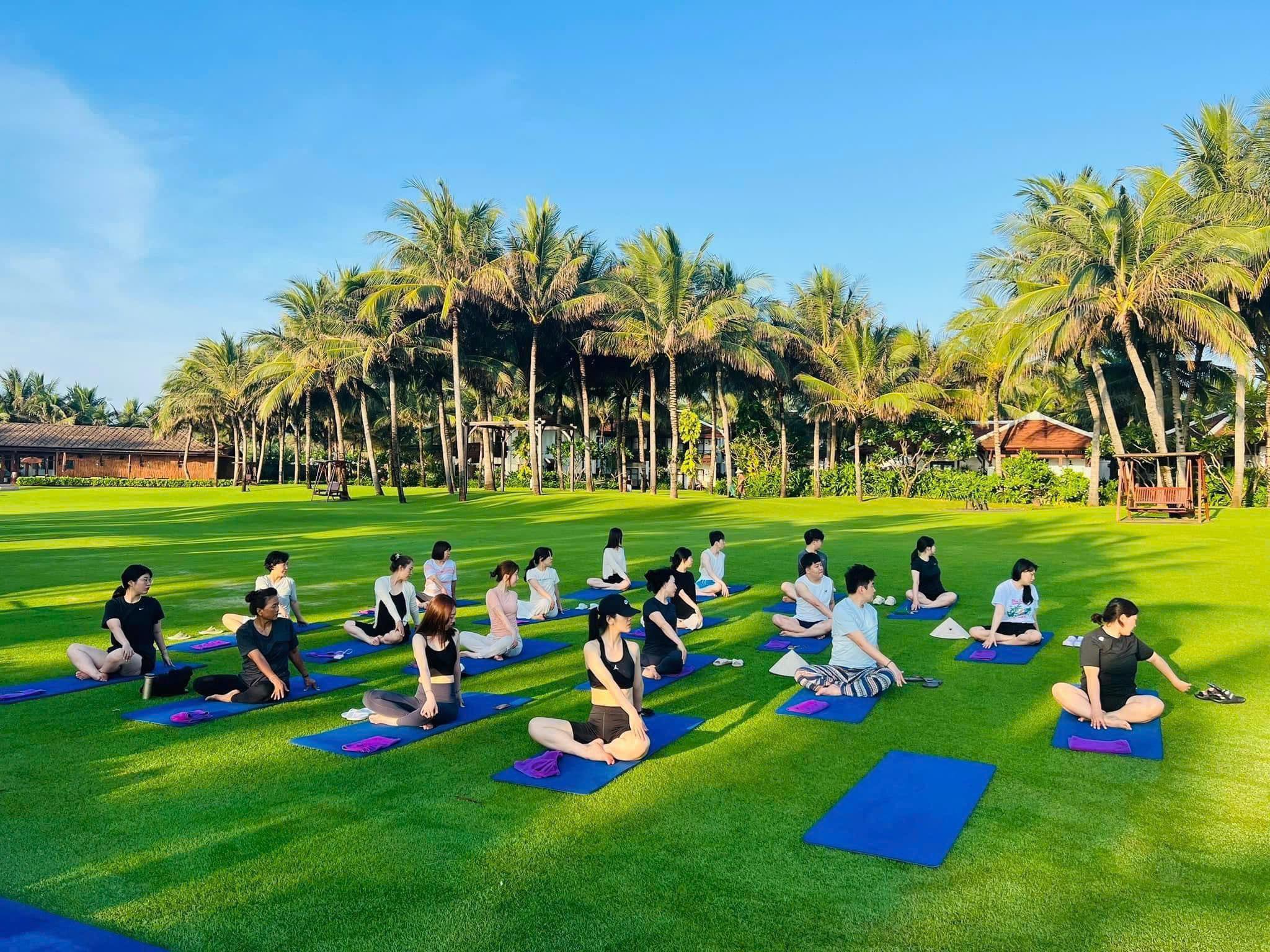 |
South Korean tourists practicing yoga at The Anam Cam Ranh resort. Photo: The Anam |
South Korean tourists practicing yoga at The Anam Cam Ranh resort. Photo: The Anam
The Anam Group Commercial Director Martin Koerner also considered the assault an individual act, not reflective of the community. "At The Anam, we consistently have positive experiences and maintain respectful, good relationships with our South Korean guests," Koerner said. Many return multiple times or are referred by other South Korean guests.
Nguyen Hai Phong, an international student who lived in South Korea for 5 years, stated that the 11/7 incident doesn't reflect the general character of South Koreans. However, he "understands why the South Korean woman acted that way."
"The South Koreans I've met are often quite short-tempered, demanding, and strict, especially how seniors (older or more experienced individuals) treat juniors (younger, less experienced individuals)," Phong said.
South Korea has a satirical term, kkondae, or "a condescending and self-righteous older person," often referring to men in middle or upper management positions. These individuals often give advice and demand absolute obedience from their subordinates. Despite facing harsh criticism, "kkondae" persists as an integral part of South Korean workplace culture, where hierarchy and seniority play a decisive role. This is also partly reflected in South Korean workplace dramas.
Nguyen Tien Dat, General Director of AZA Travel and Vice President of the Hanoi Tourism Association, also noted that most South Koreans are short-tempered. They have a habit of doing everything quickly. If someone is queuing, the person in front will try to finish as quickly as possible so the person behind doesn't have to wait long. In less-crowded restaurants with slow service, they will express their dissatisfaction. But if the restaurant serves quality food with good service, they will be happy and may stay longer, consuming more.
Besides that, South Korean tourists are also known as serious, demanding, straightforward, and high-spending.
Tour guides specializing in South Korean tourists at Viet Tourism say they receive a lot of feedback from visitors on each tour. This group of tourists seriously adheres to tour itineraries, is meticulous, and values punctuality, safe services, privacy, and quality. They frankly provide feedback on services, and their suggestions are often constructive, helping to improve quality.
"South Korean tourists are discerning but not overly demanding," Vu said.
In the first 6 months of the year, Vietnam welcomed 10.7 million international visitors, including 2.2 million South Koreans, accounting for 20% of the total and ranking second in the list of major inbound markets to Vietnam, after China.
South Korean tourists are known for their preference for high-end experiences and luxury travel, often prioritizing 4-5-star hotels, quality resorts, and all-inclusive services and entertainment. Most South Korean tourists coming to Vietnam focus on two main experiences: golfing and relaxing. They prefer coastal resorts and enjoy spa and massage services rather than extensive shopping like Chinese tourists.
Mr. Herbert noted that South Korean tourists appreciate attentive, personalized services and carefully curated culinary experiences. Most of them are knowledgeable, have refined tastes, and high standards.
Tourism experts believe that the meticulousness or occasional demanding nature of South Koreans is not a drawback or a cause for concern for the Vietnamese tourism industry. Instead, to attract even more tourists, the Vietnamese tourism industry needs to focus on understanding the personalities and preferences of each market, not just South Korea. From there, the industry will have specific measures and strategies to serve each market, helping them have fulfilling experiences when visiting Vietnam.
"The Vietnamese tourism industry always values the contribution of South Korean tourists. We should not let a few undesirable incidents lead to a misjudgment of an important market," said Mr. Vu of Viet Tourism.
Phuong Anh



